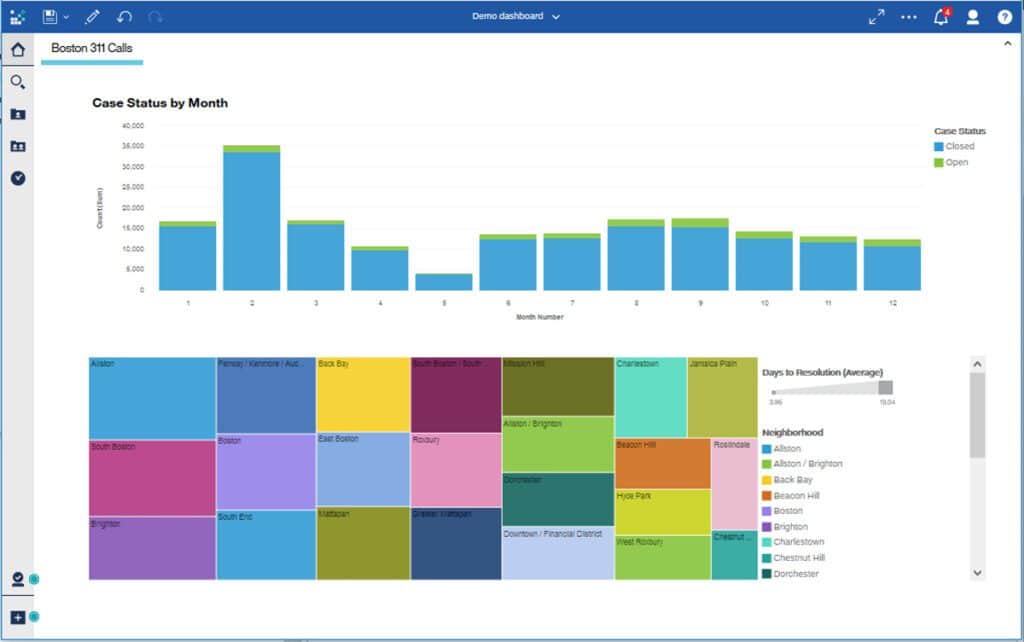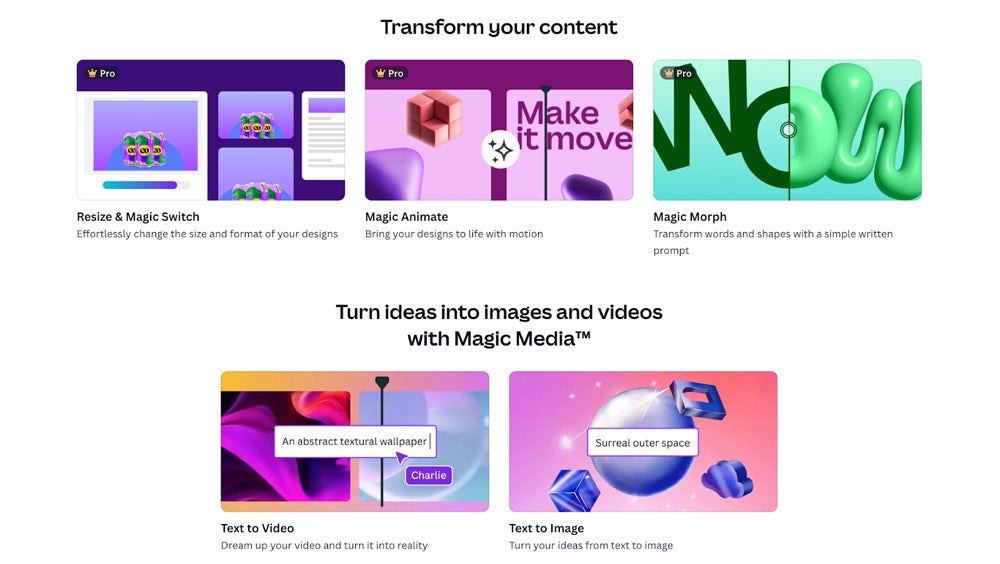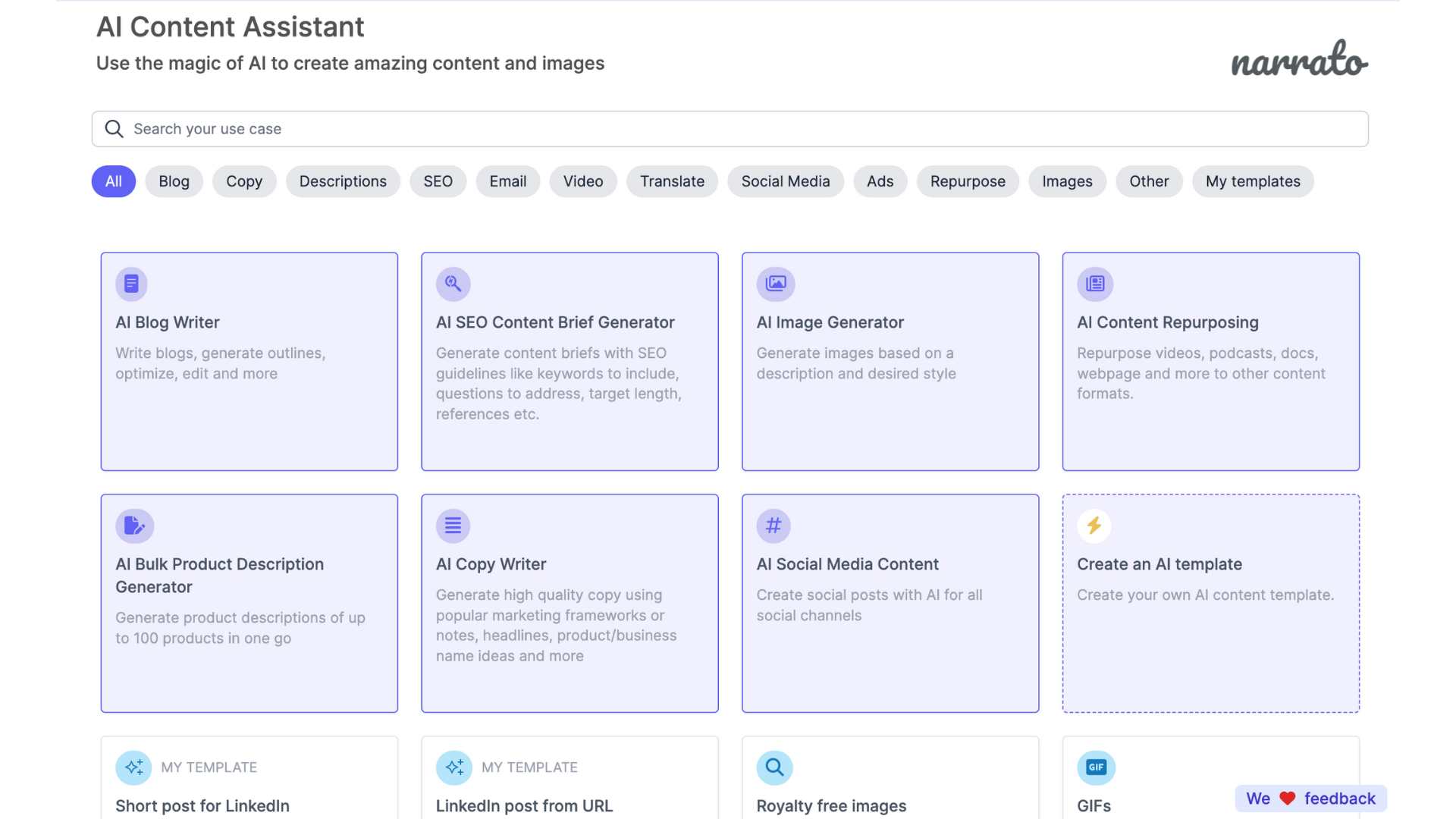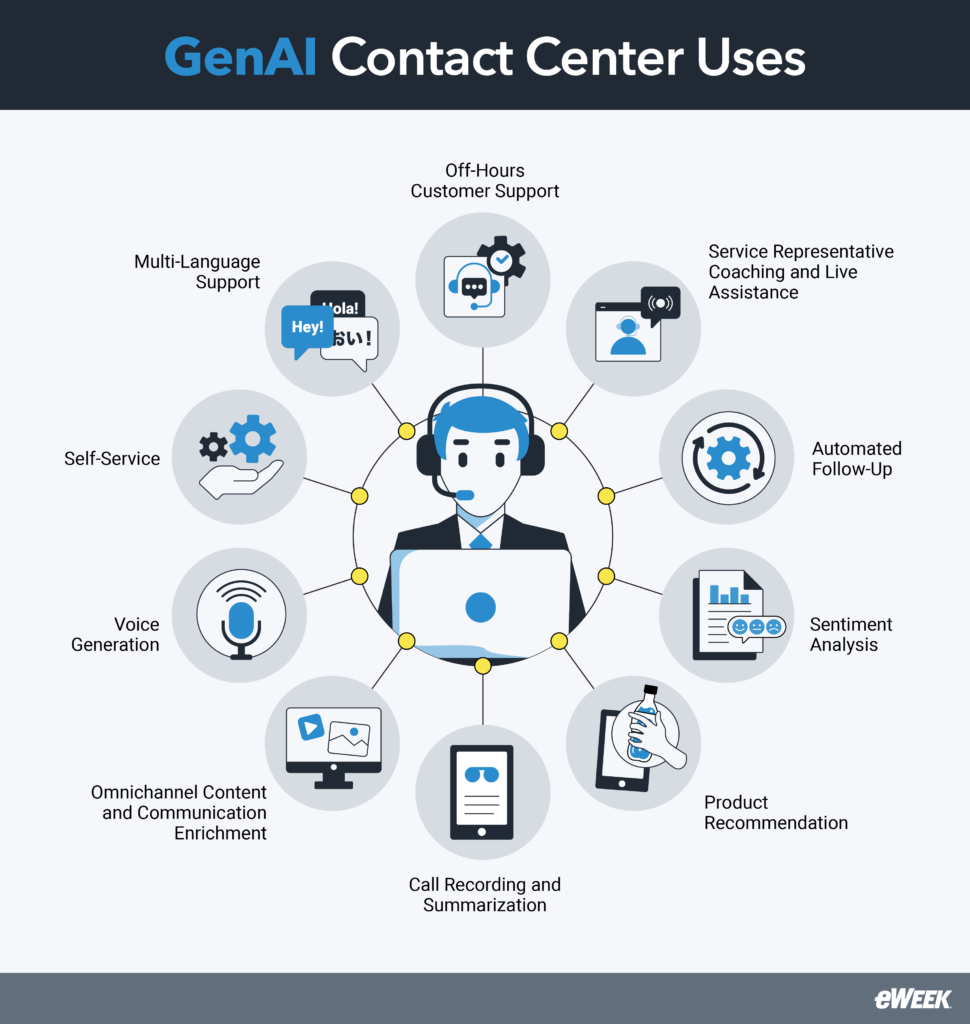IBM Cognos Analytics and Microsoft Energy BI are two of the highest enterprise intelligence (BI) and knowledge analytics software program choices available on the market at the moment.
Each of those software and repair suites are in heavy demand, as organizations search to harness real-time repositories of massive knowledge for varied enterprise use instances, together with synthetic intelligence and machine studying mannequin improvement and deployment.
When selecting between two of essentially the most extremely regarded knowledge platforms available on the market, customers typically have problem differentiating between Cognos and Energy BI and weighing every of the platform’s execs and cons. On this in-depth comparability information, we’ll examine these two platforms throughout quite a lot of qualities and variables to evaluate the place their strengths lie.
However first, right here’s a look on the areas the place every instrument excels most:
- Cognos Analytics: Finest for superior knowledge analytics and on-premises deployment. In comparison with Energy BI, Cognos is especially efficient for superior enterprise knowledge analytics use instances that require extra administrative controls over safety and governance. Moreover, it’s extra dependable in terms of processing massive portions of information shortly and precisely.
- Energy BI: Finest for reasonably priced, easy-to-use, integrable BI expertise within the cloud. In comparison with Cognos Analytics, Energy BI is way more versatile and can match into the price range, ability units, and different necessities of a wider vary of groups. Most important, this platform provides free entry variations which might be nice for groups which might be simply getting began with any such expertise.
TABLE OF CONTENTS
Toggle
- Cognos vs. Energy BI at a Look
- What Is Cognos?
- What Is Energy BI?
- Finest for Core Options: It Relies upon
- Finest for Ease of Use and Implementation: Energy BI
- Finest for Superior Analytics Capabilities: Cognos
- Finest for Cloud Customers: Energy BI; Finest for On-Prem Customers: Cognos
- Finest for Integrations: It Relies upon
- Finest for Pricing: Energy BI
- Why Shouldn’t You Use Cognos or Energy BI?
- If Cognos or Energy BI Isn’t Very best for You, Examine Out These Alternate options
- Assessment Methodology
- Backside Line: Cognos vs. Energy BI
Cognos vs. Energy BI at a Look
Core Options Ease of Use and Implementation Superior Analytics Capabilities Cloud vs. On-Prem Integrations Pricing
Cognos Depending on Use Case Higher for On-Prem Depending on Use Case
Energy BI Depending on Use Case Higher for Cloud Depending on Use Case
What Is Cognos?
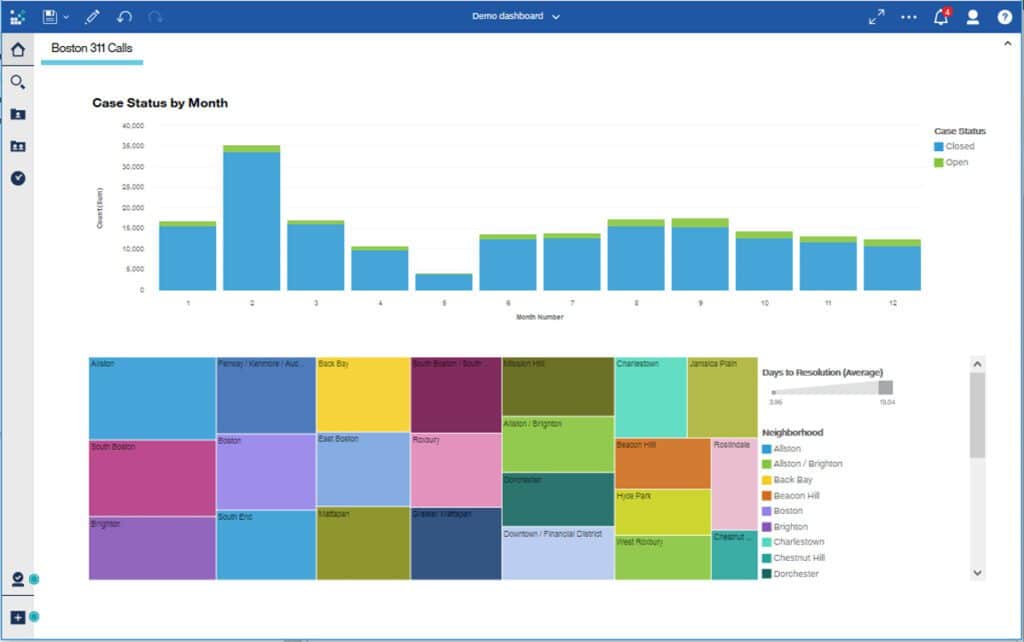 An instance of an interactive dashboard inbuilt Cognos Analytics. Supply: IBM
An instance of an interactive dashboard inbuilt Cognos Analytics. Supply: IBM
Cognos Analytics is a enterprise intelligence suite of options from IBM that mixes AI-driven help, superior reporting and analytics, and different instruments to assist varied enterprise knowledge administration necessities. The platform is offered each within the cloud and on demand for on-premises and {custom} enterprise community configurations.
With its vary of options, Cognos allows customers to attach, confirm, and mix knowledge and provides loads of dashboard and visualization choices. Cognos is especially good at pulling and analyzing company knowledge, offering detailed studies, and helping in company governance. It’s constructed on a powerful knowledge science basis and is supported by heavy-duty analytics and suggestions, courtesy of IBM Watson.
Additionally see: High Enterprise Intelligence Software program
Go to Cognos
Key Options of Cognos
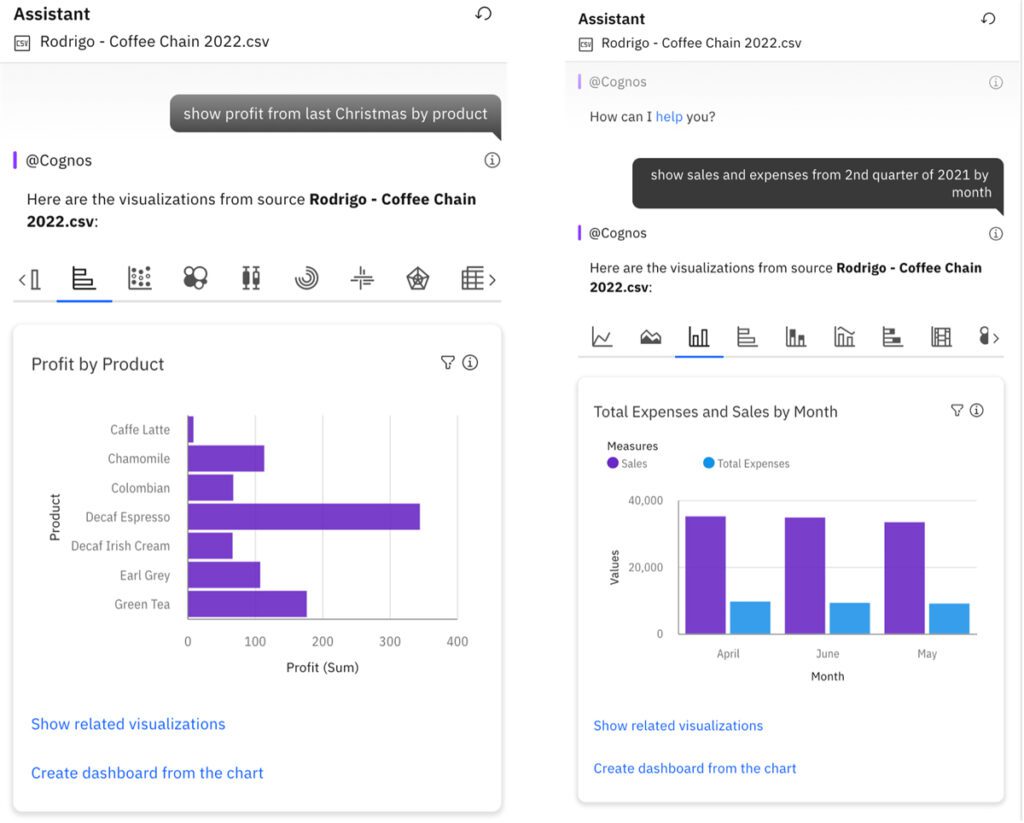 Powered by the newest model of Watson, Cognos Analytics provides AI help that every one customers can entry by way of pure language queries. Supply: IBM
Powered by the newest model of Watson, Cognos Analytics provides AI help that every one customers can entry by way of pure language queries. Supply: IBM
- AI-driven insights: The platform advantages from veteran AI assist within the type of Watson, which helps with knowledge visualization design, dashboard builds, forecasting, and knowledge explainability. That is significantly useful for customers with restricted knowledge science and coding expertise who want to tug in-depth analyses from advanced datasets.
- Information democratization by way of pure language: Superior pure language capabilities make it attainable for citizen knowledge scientists and less-experienced tech professionals to create correct and detailed knowledge visualizations.
- Superior reporting and dashboarding: Multi-user studies and dashboards, personalised report technology, AI-powered dashboard design, and simple shareability make this an excellent platform for organizations that require completely different ranges of information visibility and granularity for various stakeholders.
- Automation and governance: In depth automation and governance capabilities assist energy customers scale their operations with out compromising knowledge safety. The platform’s sturdy governance and security measures are vital to extremely regulated companies and huge enterprises specifically.
Professionals
- The platform is effectively built-in with different enterprise instruments, like Slack and varied e mail inboxes, making it simpler to collaborate and share insights throughout a workforce.
- Its AI assistant works effectively for quite a lot of knowledge analytics and administration duties, even for customers with no knowledge science expertise, due to its pure language interface.
- Cognos comes with versatile deployment choices, together with on-demand cloud, hosted cloud, and consumer internet hosting for both on-premises or IaaS infrastructure.
Cons
- The platform just isn’t significantly mobile-friendly in comparison with comparable opponents.
- Whereas a spread of visuals can be found on the platform, many consumer critiques point out that the platform’s visuals are restricted and never very customizable.
- Relying in your precise necessities, Cognos Analytics can turn out to be fairly costly, particularly in case you have a excessive consumer depend or require extra superior options like safety and consumer administration.
What Is Energy BI?
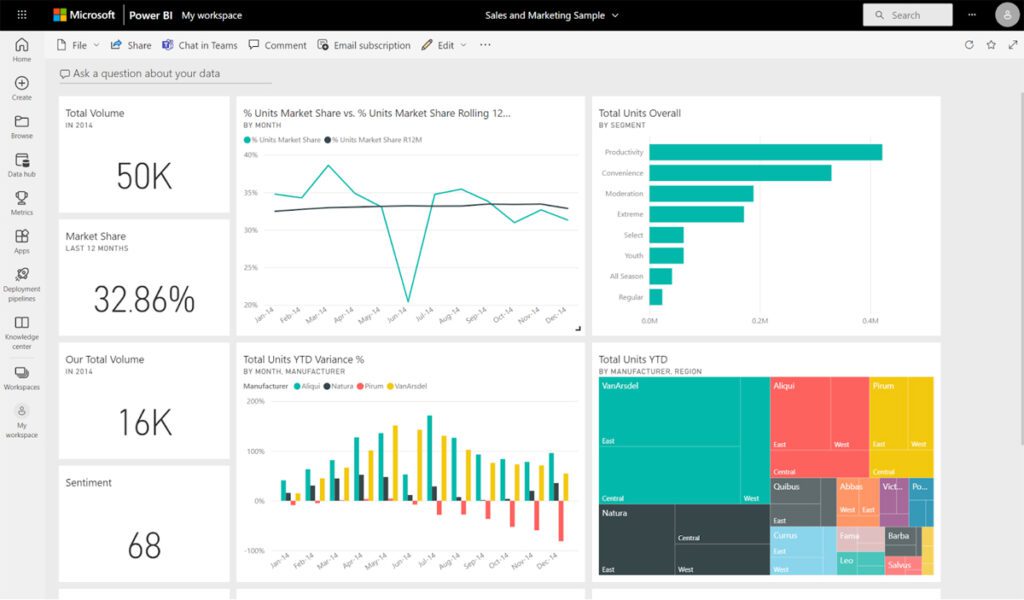 An instance setup for a Microsoft Energy BI dashboard. Supply: Microsoft
An instance setup for a Microsoft Energy BI dashboard. Supply: Microsoft
Microsoft Energy BI is a enterprise intelligence and knowledge visualization software program resolution that acts as one a part of the Microsoft Energy Platform. Due to its unification with different Energy Platform merchandise like Energy Automate, Energy Apps, and Energy Pages, this BI instrument provides customers numerous low-code and AI-driven operations for extra streamlined knowledge analytics and administration. Further integrations with the likes of Microsoft 365, Groups, Azure, and SharePoint are a significant promoting level, as many enterprise customers are already extremely invested in these enterprise functions and are aware of the Microsoft strategy to UX/UI.
Particular to analytics features, Energy BI focuses most closely on knowledge preparation, knowledge discovery, dashboards, and knowledge visualization. Its core options allow customers to take visualizations to the subsequent degree and empower them to make data-driven choices, collaborate on studies, and share insights throughout fashionable functions. They will additionally create and modify knowledge studies and dashboards simply and share them securely throughout functions.
Go to Energy BI
Key Options of Energy BI
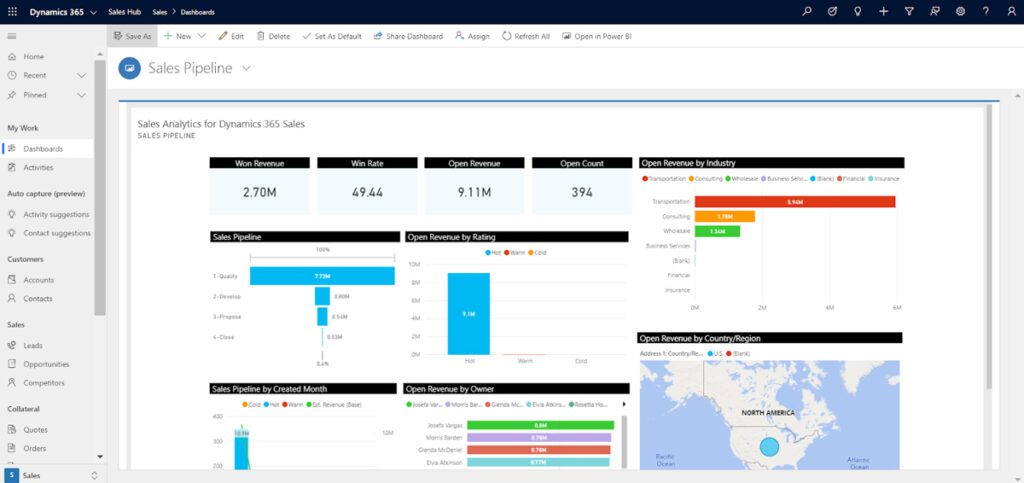 Energy BI seamlessly integrates with Microsoft’s ERP and CRM software program, Dynamics 365, and makes it simpler for customers to research gross sales knowledge with visualization templates. Supply: Microsoft.
Energy BI seamlessly integrates with Microsoft’s ERP and CRM software program, Dynamics 365, and makes it simpler for customers to research gross sales knowledge with visualization templates. Supply: Microsoft.
- Quickly increasing AI analytics: AI-powered knowledge evaluation and report creation have already been established on this platform, however lately, the generative AI Copilot instrument has additionally come into preview for Energy BI. This expands the platform’s capacity to create studies extra shortly, summarize and clarify knowledge in actual time, and generate DAX calculations.
- CRM integration: Energy BI integrates comparatively effectively with Microsoft Dynamics CRM, which makes it an excellent possibility for in-depth advertising and marketing and gross sales analytics duties. Many comparable knowledge platforms don’t provide such easy CRM integration capabilities.
- Embedded and built-in analytics: The platform is offered in many various codecs, together with as an embedded analytics product. This makes it attainable for customers of different Microsoft merchandise to simply incorporate superior analytics into their different most-used Microsoft merchandise. You may as well embed detailed studies in different apps for key stakeholders who want data in a digestible format.
- Complete visualizations: Adjustable dashboards, AI-generated and templated studies, and quite a lot of self-service options allow customers to arrange visuals that may be alphanumeric, graphical, and even embody geographic areas and maps. Energy BI’s many native visualization choices imply customers received’t need to spend an excessive amount of time making an attempt to custom-fit their dashboards and studies to their firm’s particular wants.
Professionals
- Energy BI is without doubt one of the extra mobile-friendly knowledge platforms available on the market at the moment.
- Along with its user-friendly and easy-to-learn interface, Microsoft provides a spread of studying assets and is praised for its buyer assist.
- Its AI-powered capabilities proceed to develop, particularly by way of the corporate’s shut partnership with OpenAI.
Cons
- Some customers have commented on the instrument’s outdated interface and the way knowledge updates, particularly for giant quantities of information, could be gradual and buggy.
- The platform, particularly the Desktop instrument, makes use of lots of processing energy, which may sometimes result in slower load instances and platform crashes.
- Shareability and collaboration options are extremely restricted outdoors of its highest paid plan tier.
Finest for Core Options: It Relies upon
It’s a toss-up in terms of the core options Cognos Analytics and Energy BI deliver to the desk.
Microsoft Energy BI’s core options embody a succesful cell interface, AI-powered analytics, democratized report-building instruments and templates, and intuitive integrations with different Microsoft merchandise.
IBM Cognos Analytics’ core options embody a web-based report authoring instrument, natural-language and AI-powered analytics, customizable dashboards, and safety and entry administration capabilities. Each instruments provide quite a lot of core options that work to stability robustness and accessibility for analytics duties.
To actually differentiate itself, Microsoft constantly releases updates to its cloud-based providers, with notable updates and have additions over the previous couple of years together with AI-infused experiences, good narratives (NLG), and anomaly detection capabilities. Moreover, a Energy BI Premium model allows multi-geography capabilities and the flexibility to deploy capability to one in every of dozens of information facilities worldwide.
Alternatively, IBM has carried out in depth work to replace the Cognos dwelling display screen, simplifying the consumer expertise and giving it a extra trendy feel and look. Onboarding for brand spanking new customers has been streamlined with video tutorials and accelerator content material organized in an easy-to-consume format. Moreover, improved search capabilities and enhancements to the Cognos AI Assistant and Watson options assist generate dashboards mechanically, suggest one of the best visualizations, and counsel inquiries to ask — by way of pure language question — to dive deeper into knowledge exploration.
Taking these core capabilities and up to date additions into consideration, which product wins on core options? Properly, it depends upon the consumer’s wants. For many customers, Energy BI is a stronger possibility for normal cloud and mobility options, whereas Cognos takes the lead on superior reporting, knowledge governance, and safety.
Additionally see: High Dashboard Software program & Instruments
Finest for Ease of Use and Implementation: Energy BI
Though it’s shut, new customers of those instruments appear to seek out Energy BI a bit simpler to make use of and arrange than Cognos Analytics.
Because the complexity of your necessities rises, although, the Energy BI platform grows tougher to navigate. Customers who’re aware of Microsoft instruments shall be in one of the best place to make use of the platform seamlessly, as they’ll make the most of expertise from functions they already use, equivalent to Microsoft Excel, to maneuver from constructing to analyzing to presenting with much less knowledge preparation. Additional, all Energy BI customers have entry to loads of free studying alternatives that allow them to quickly begin constructing studies and dashboards.
Cognos, alternatively, has a tougher studying curve, however IBM has been engaged on this, significantly with current consumer interface updates, guided UI for dashboard builds, and assistive AI. The instrument’s AI-powered and Watson-backed analytics capabilities specifically decrease the barrier of entry to using superior knowledge science strategies.
The conclusion: Energy BI wins on broad utilization by a non-technical viewers, whereas IBM has the sting with technical customers and continues to enhance its stance with less-technical customers. General, Energy BI wins on this class because of typically extra favorable consumer critiques and commentary about ease of use.
Additionally see: High AI Software program
Finest for Superior Analytics Capabilities: Cognos
Cognos Analytics surpasses Energy BI for its number of in-depth and superior analytics operations.
Cognos integrates properly with different IBM options, just like the IBM Cloud Pak for Information platform, which extends the instrument’s already sturdy knowledge evaluation and administration options. It additionally brings collectively a large number of information sources in addition to an AI Assistant instrument that may talk in plain English, sharing quick suggestions which might be straightforward to grasp and implement. Moreover, the platform generates an in depth assortment of visualizations. This consists of geospatial mapping and dashboards that allow the consumer to drill down, rise, or transfer horizontally by way of visuals which might be up to date in actual time.
Current updates to Cognos’s analytical capabilities embody a show of narrative insights in dashboard visualizations to point out significant elements of a chart’s knowledge in pure language, the flexibility to specify the zoom degree for dashboard viewing and horizontal scrolling in visualizations, in addition to different visualization enhancements.
On the modeling aspect of Cognos, knowledge modules could be dynamically redirected to completely different knowledge server connections, schemas, or catalogs at run-time. Additional, the Convert and Relink choices can be found for every type of referenced tables, and higher web-based modeling has been added.
Nonetheless, it’s vital to notice that Cognos nonetheless takes a relatively inflexible, templated strategy to visualization, which makes {custom} configurations troublesome and even inconceivable for sure use instances. Moreover, some customers say it takes in depth technical aptitude to do extra advanced evaluation.
Energy BI’s energy is out-of-the-box analytics that doesn’t require in depth integration or knowledge science smarts. It recurrently provides to its function set. Extra lately, it has added new options for embedded analytics that allow customers to embed an interactive knowledge exploration and report creation expertise in functions equivalent to Dynamics 365 and SharePoint.
For modeling, Microsoft has added two new statistical DAX features, making it attainable to concurrently filter a couple of desk in a distant supply group. It additionally provides an Optimize ribbon in Energy BI Desktop to streamline the method of authoring studies (particularly in DirectQuery mode) and extra conveniently launch Efficiency Analyzer to research queries and generate report visuals. And whereas Copilot continues to be in preview right now, this instrument reveals promise for advancing the platform’s superior analytics capabilities with out negatively impacting its ease of use.
In abstract, Energy BI is nice at crunching and analyzing real-time knowledge and continues to develop its capabilities, however Cognos Analytics maintains its edge, particularly as a result of Cognos can conduct far deeper analytics explorations on bigger quantities of information with out as many reported efficiency points.
Additionally see: Information Analytics Traits
Finest for Cloud Customers: Energy BI; Finest for On-Prem Customers: Cognos
Each platforms provide cloud and on-premises choices for customers, however every one has a transparent area of interest: Energy BI is most profitable on the cloud, whereas Cognos has its roots in on-prem setups.
Energy BI has a totally practical SaaS model working in Azure in addition to an on-premises model within the type of Energy BI Report Server. Energy BI Desktop can be supplied without spending a dime as a standalone private evaluation instrument.
Though Energy BI does provide on-prem capabilities, energy customers who’re engaged in advanced evaluation of a number of on-premises knowledge sources usually nonetheless have to obtain Energy BI Desktop along with working with Energy BI Report Server. The on-premises product is extremely restricted in terms of dashboards, streaming analytics, pure language, and alerting.
Cognos additionally provides each cloud and on-premises variations, with on-demand, hosted, and versatile on-premises deployment choices that assist reporting, dashboarding, visualizations, alters and monitoring, AI, and safety and consumer administration, no matter which deployment you select. Nonetheless, Cognos’ DNA is rooted in on-prem, so it lags behind Microsoft on cloud-based bells and whistles.
Subsequently, Microsoft will get the nod for cloud analytics, and Cognos for on-prem, however each are able to working in both format.
Additionally see: High Information Visualization Instruments
Finest for Integrations: It Relies upon
Each Cognos Analytics and Energy BI provide a spread of useful knowledge storage, SaaS, and operational instrument integrations that customers discover useful. Finally, neither instrument wins this class as a result of they every have completely different strengths right here.
Microsoft provides an in depth array of integration choices natively, in addition to APIs and partnerships that assist to make Energy BI extra extensible. Energy BI is tightly embedded into a lot of the Microsoft ecosystem, which makes it ideally fitted to present Azure, Dynamics, Microsoft 365, and different Microsoft clients. Nonetheless, the corporate is dealing with some challenges in terms of integrations past this ecosystem, and a few consumer critiques have mirrored frustrations with that problem.
IBM Cognos connects to numerous knowledge sources, together with spreadsheets. It’s effectively built-in into a number of elements of the huge IBM portfolio. It integrates properly, for instance, with the IBM Cloud Pak for Information platform and extra lately has added integration with Jupyter notebooks. This implies customers can create and add notebooks into Cognos Analytics and work with Cognos Analytics knowledge in a pocket book utilizing Python scripts. The platform additionally comes with helpful third-party integrations and connectors for instruments like Slack, which assist to increase the instrument’s collaborative utilization capabilities.
This class is all about which platform and IT ecosystem you reside inside, so it’s arduous to say which instrument provides one of the best integration choices in your wants. These invested in Microsoft will get pleasure from tight integration inside that sphere in the event that they choose Energy BI. Equally, those that are dedicated to all issues IBM will benefit from the some ways IBM’s numerous product and repair set match with Cognos.
Additionally see: Digital Transformation Information: Definition, Sorts & Technique
Finest for Pricing: Energy BI
Whereas Cognos Analytics provides some lower-level instrument options at a low worth level, Energy BI provides extra complete and reasonably priced entry-level packages to its customers.
Microsoft is superb at preserving costs low as a tactic for rising market share. It provides lots of options at a comparatively low worth. Energy BI Professional, for instance, prices roughly $10 per consumer per 30 days, whereas the Premium plan is $20 per consumer per 30 days. Free, considerably restricted variations of the platform are additionally obtainable by way of Energy BI Desktop and free Energy BI accounts in Microsoft Material.
The underside line for any rival is that it’s arduous to compete with Microsoft Energy BI on worth, particularly as a result of a lot of its most superior options — together with automated ML capabilities and AI-powered providers — can be found in reasonably priced plan choices.
IBM Cognos Analytics, alternatively, has a repute for being costly. It’s arduous for IBM to compete with Energy BI on worth alone.
IBM Cognos Analytics pricing begins at $10 per consumer per 30 days for on-demand cloud entry and $5 per consumer per 30 days for restricted cell consumer entry to visuals and alerts on the cloud-hosted or client-hosted variations. For customers who need greater than viewer entry and essentially the most fundamental of capabilities, pricing could be wherever from $40 to $450 per consumer per 30 days.
Due to the key variations in what every product provides in its reasonably priced plans, Microsoft wins on pricing.
Additionally see: Information Mining Methods
Why Shouldn’t You Use Cognos or Energy BI?
Whereas each knowledge and BI platforms provide in depth capabilities and helpful options to customers, it’s attainable that these instruments received’t meet your explicit wants or align with industry-specific use instances in your discipline. If any of the next factors are true for your corporation, chances are you’ll wish to take into account an alternative choice to Cognos or Energy BI:
Who Shouldn’t Use Cognos
The next kinds of customers and corporations ought to take into account options to Cognos Analytics:
- Customers or corporations with smaller budgets or who need a simple, single pricing package deal; Cognos tends to have up-charges and add-ons which might be solely obtainable at a further price.
- Customers who require in depth customization capabilities, significantly for knowledge visualizations, dashboards, and knowledge exploration.
- Customers who need a extra superior cloud deployment possibility.
- Customers who’ve restricted expertise with BI and knowledge analytics expertise; this instrument has a better studying curve than a lot of its opponents and restricted templates for getting began.
- Customers who’re already effectively established with one other vendor ecosystem, like Microsoft or Google.
Who Shouldn’t Use Energy BI
The next kinds of customers and corporations ought to take into account options to Energy BI:
- Customers preferring to do their work on-line relatively than on a cell gadget; sure options are buggy outdoors of the cell interface.
- Customers who should not already effectively acquainted and built-in with the Microsoft ecosystem could face a steep studying curve.
- Customers preferring to handle their knowledge in knowledge warehouses relatively than spreadsheets; whereas knowledge warehouse and knowledge lake integrations can be found, together with for Microsoft’s OneLake, many customers run into points with knowledge high quality in Excel.
- Customers preferring a extra trendy UI that updates in actual time.
- Customers who primarily use Macs and Apple merchandise; some customers have reported bugs when making an attempt to make use of Energy BI Desktop on these units.
Additionally see: Finest Information Analytics Instruments
If Cognos or Energy BI Isn’t Very best for You, Examine Out These Alternate options
Whereas Cognos and Energy BI provide in depth options that can meet the wants of many BI groups and initiatives, they is probably not one of the best match in your explicit use case. The next options could show a greater match:
![]()
Domo
Domo places knowledge to work for everybody to allow them to lengthen their knowledge’s affect on the enterprise. Underpinned by a safe knowledge basis, the platform’s cloud-native knowledge expertise makes knowledge seen and actionable with user-friendly dashboards and apps. Domo is very praised for its capacity to assist corporations optimize essential enterprise processes at scale and shortly.
Be taught extra about Domo
![]()
Yellowfin
Yellowfin is a number one embedded analytics platform that gives intuitive self-service BI choices. It’s significantly profitable at accelerating knowledge discovery. Moreover, the platform permits anybody, from an skilled knowledge analyst to a non-technical enterprise consumer, to create studies in a ruled method.
Be taught extra about Yellowfin
![]()
Wyn Enterprise
Wyn Enterprise provides a scalable embedded enterprise intelligence platform with out hidden prices. It supplies BI reporting, interactive dashboards, alerts and notifications, localization, multitenancy, and white-labeling in quite a lot of inside and business apps. Constructed for self-service BI, Wyn provides in depth visible knowledge exploration capabilities, making a data-driven mindset for the on a regular basis consumer. Wyn’s scalable, server-based licensing mannequin permits room for your corporation to develop with out consumer charges or limits on knowledge dimension.
Be taught extra about Wyn Enterprise
![]()
Zoho Analytics
Zoho Analytics is a prime BI and knowledge analytics platform that works significantly effectively for customers who need self-service capabilities for knowledge visualizations, reporting, and dashboarding. The platform is designed to work with a variety of information codecs and sources, and most importantly, it’s effectively built-in with a Zoho software program suite that features instruments for gross sales and advertising and marketing, HR, safety and IT administration, venture administration, and finance.
Be taught extra about Zoho Analytics
![]()
Sigma
Sigma is a cloud-native analytics platform that delivers real-time insights, interactive dashboards, and studies, so you can also make data-driven choices on the fly. With Sigma’s intuitive interface, you don’t have to be an information professional to dive into your knowledge, as no coding or SQL is required to make use of this instrument. Sigma has additionally lately introduced forth Sigma AI options for early entry preview.
Be taught extra about Sigma
Assessment Methodology
The 2 merchandise on this comparability information had been assessed by way of a mix of studying product supplies on vendor websites, watching demo movies and explanations, reviewing buyer critiques throughout key metrics, and straight evaluating every product’s core options by way of a comparability graph.
Under, you will notice 4 key evaluation classes that we targeted on in our analysis. The chances used for every of those classes characterize the load of the specific rating for every product.
Consumer expertise – 30%
Our evaluation positioned a heavy emphasis on consumer expertise, contemplating each ease of use and implementation in addition to the maturity and reliability of product options. We seemed for options like AI help and low-code/no-code capabilities that lessened the educational curve, in addition to studying supplies, tutorials, and constant buyer assist assets. Moreover, we paid consideration to consumer critiques that commented on the product’s reliability and any points with bugs, processing instances, product crashes, or different efficiency points.
Superior analytics and scalability – 30%
To actually do enterprise intelligence effectively, particularly for contemporary knowledge analytics necessities, BI instruments want to supply superior capabilities that scale effectively. For this evaluation, we emphasised AI-driven insights, visuals which might be configurable and up to date in actual time, shareable and collaborative studies and dashboards, and complete options for knowledge preparation, knowledge modeling, and knowledge explainability. So far as scalability goes, we not solely seemed on the high quality of every of those instruments but in addition assessed how effectively they carry out and course of knowledge on larger-scale operations. We significantly highlighted any consumer critiques that talked about efficiency lag instances or different points when processing massive quantities of information.
Integrations and platform flexibility – 20%
As a result of these platforms have to be effectively built-in right into a enterprise’s knowledge sources and most-used enterprise functions to be helpful, our evaluation additionally paid consideration to how integrable and versatile every platform was for various use instances. We thought of not solely how every instrument integrates with different instruments from the identical vendor but in addition which knowledge sources, collaboration and communication functions, and different third-party instruments are straightforward to combine with native integrations and connectors. We additionally thought of the standard of every instrument’s APIs and different {custom} alternatives for integration, configuration, and extensibility.
Affordability – 20%
Whereas affordability just isn’t the be-all-end-all in terms of BI instruments, it’s vital to many customers that they discover a instrument that balances an accessible worth level with a sturdy function set. That’s why we additionally checked out every instrument’s affordability, specializing in entry worth factors, what key options are and should not included in lower-tier pricing packages, and the jumps in pricing that happen as you turn from tier to tier. We additionally thought of the price of any further add-ons that customers would possibly want, in addition to the potential price of partnering with a third-party professional to implement the software program efficiently.
Backside Line: Cognos vs. Energy BI
Microsoft is dedicated to investing closely in Energy BI and enhancing its integrations throughout different Microsoft platforms and a rising variety of third-party options. Any group that could be a heavy consumer of Workplace 365, Groups, Dynamics, and/or Azure will discover it arduous to withstand some great benefits of deploying Energy BI.
And people benefits are solely going to extend. On the AI entrance, for instance, the corporate boasts round 100,000 clients utilizing Energy BI’s AI providers. It is usually placing effort into increasing its AI capabilities, with the generative AI-driven Copilot now in preview for Energy BI customers. For customers with a watch on their price range who don’t wish to compromise on superior analytics and BI options, Energy BI is a superb possibility.
However IBM isn’t referred to as Massive Blue for nothing. It boasts an enormous gross sales and providers workforce and world attain into massive enterprise markets. It has additionally vastly expanded its platform’s AI capabilities, making it a powerful instrument for democratized knowledge analytics and superior analytics duties throughout the board.
The place Cognos Analytics has its most distinct benefit is on the excessive finish of the market. Microsoft provides many of the options that small, midsize, and bigger enterprises want for analytics. Nonetheless, on the very excessive finish of the analytics market, and in company environments with hefty governance and reporting necessities or legacy and on-premises tooling, Cognos has carved out a strategic area of interest that it serves effectively.
Finally, both instrument may work in your group, relying in your price range, necessities, and former BI tooling expertise. Crucial step you possibly can take is to talk straight with representatives from every of those distributors, demo these instruments, and decide which product consists of essentially the most advantageous capabilities in your workforce.
Learn subsequent: 10 Finest Machine Studying Platforms

